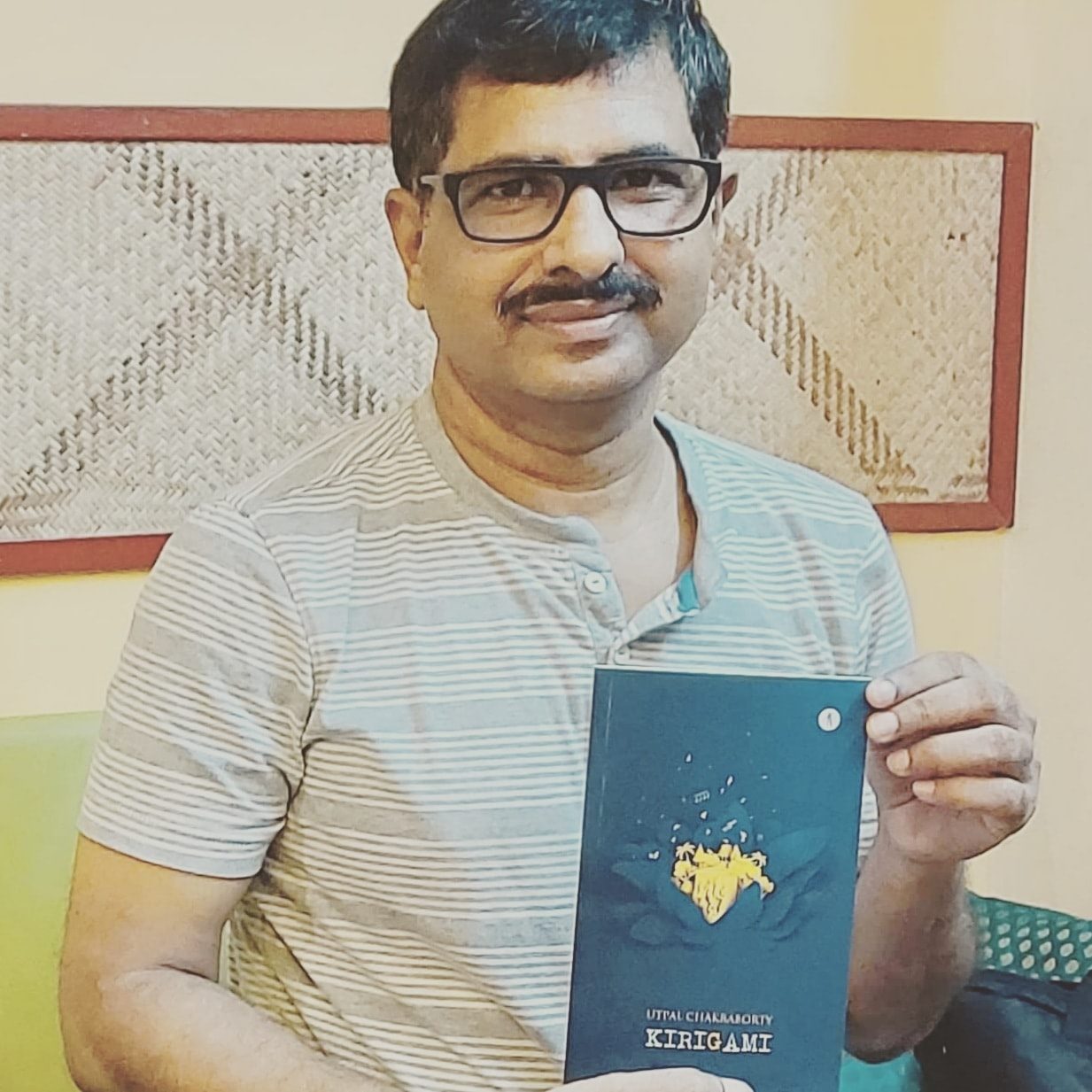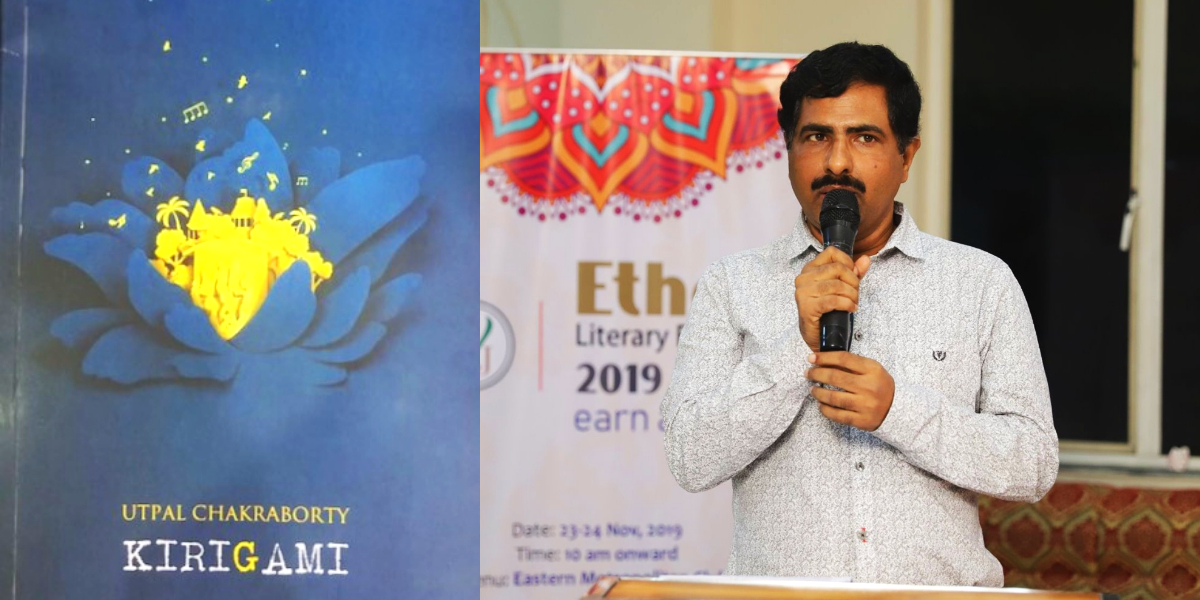Poetry in the true sense of the term is lived experience communicated in a way that strikes a chord with the reader. Fidelity to observable actualities of life around him is definitely a major strand in the many-hued weave that is Kirigami, a volume of poems by Utpal Chakraborty. But transcending this rootedness in reality, there is a profound probing of the workings of his inner psyche which lends substance and depth to the volume and makes it a stimulating read. As the poet himself affirms in his prefatory, ‘ My Pilgrimage’: My verses are inspired by my very personal experience of the contemporary events–what I see around –my takeaways from an eclectic range of reading on philosophy, science, religion, and human psychology, along with my philosophy of looking into the mysteries of the world. While many celebrated poets have found their muses in different objects and beliefs, I have found them in my inner self. I write burning my hands.’ That this delving into the inner psyche is like a sacred journey of exploration is made clear by ‘ My pilgrimage’, which gives the reader a clue to the source material for the poems as well as to their distinctive essence. And over and above everything, there is the poet’s vision of life that creates harmony out of a curious melange of seemingly irreconcilable experiences, which is what justifies the title of the volume. As the poet tells us in the titular poem, ‘Kirigami’: ‘ What precipitates is the fabric/ the ziggurat of the broken pieces / of your white paper.’ Their cohesion is chaos, unity in multiplicity, concord in the apparent discordance.
The poet sees around him much that hangs like a dark pall over human life. He sees lengthening shadows of corruption, market-driven consumerism and steady erosion of human values and his sense of anguished outrage finds expression in his sensitive use of imagery at once palpably concrete and richly evocative–imagery that carries a tremendous emotional charge. The images are no decorative set pieces but are functional and integrally related to the tenor and the themes of the poems. In the poem ‘Nudity’ which opens the volume, the poet says he would take out all the tapestry, / all the ornaments/from the storeroom, / undress a poem to savour the infantile perfume of the travail.’ The poet’s express intention is to pierce through to man’s angst-ridden existence in the present world. The reader cannot help being struck by the images, visual aural and tactile with which the volume is replete: the evocative images of childhood in ‘Paradise’ ( goose bumps of bedtime stories’, ‘ smeared in afternoon sports’); visual, olfactory, tactile and aural images in ‘New Normal'( ‘delicate pores of a Britannia biscuit’, ‘ shadow less me inside’, ‘All ears to the beatings of / Of the sinking stars’); images of ‘ripening rice sheaves’ that hang that ‘ meander through the alleys/ fumbling for a few rays in the dark’ and of the creek that ‘ gurgles inside the hills’ in ‘ Golden Husks’ ; images from the world of music in ‘Picture’ (store the colourful tehai / of the birds on/ the top of the twigs’, ‘ unknown source of the opposite Jhala / in the darkening forest’); compelling images of ‘dementia’ which accumulates like sapsuckers/ in the hollows of the tree’ and of ‘clouds and rainbows’ which gradually dissipate / from the horns of deer’ in ‘ Eternal Tree’ ; the arresting images of a fog ‘ perching on/ the paws of a black cat’ and ‘eyeing the jutted dentures of the dinosaurs’; the images of ‘ wounded twigs ‘ which ‘bank upon their will to shoot up’ and of ‘the sky’s tears raining / hued lines on the boundless canvas in ‘ Emancipation’ ; the rather strange image which fuses ‘burning lava’ with sweet home’ and ‘Tsunami’ with ‘ shopping mall’, followed by the anti-climactic ‘ the clank of the utensils in the kitchen’ in ‘Gandhar’. The poem, ‘ A Platform’ encapsulates the grim image of a boasting half/ naked woman’ shouting to break the world/ with a single stroke of her finger’ and that of the ‘ unequal fight with the night’ which ‘ glues the pauper to the concrete.’ The poet’s imagery blends realism and surrealistic fantasy in ‘ Lockdown’.
Quite a few poems conjure up to our minds the apocalyptic , nightmarish vision of the catastrophe awaiting mankind as a consequence of man’s inordinate greed and relentless destruction of environment, man’s fragmentation of his self and his growing sense of alienation a world besotted with technology. This vision is most tellingly projected in the poem, ‘ An Eclipse’:
The Earth quakes.
Rivers break their banks.
Fire burns at random.
The sky gets electrified.
The gentle gale whines into hurricane.
You too lose your equanimity at times.
The trigger is all the same.
An Eclipse.
In ‘Sadism’ we have the same kind of dark epiphany in the lines: ‘ Rapture runs riot on the sun of temperance to hide your barrenness, blood falls down the cheeks of time like waterfalls , in ‘ House’ we have the vision of how ‘ the particles and the house gradually become Harappa in front of my eyes.’ The poet takes the reader along his wide ranging journeys from the past to the future and across far-flung spaces. In ‘Stratosphere’ and ‘Stroke’ we experience a sense of civilization irrevocably disintegrating: ‘ The Sea usurps the earth. The black holes and the white dwarfs in the process of eating up the stars become small themselves. Soon the myth of the earth reduces into an atom. I myself disappear…'(‘Stroke’). ‘Nothing’ is an exposure of man’s sense of terror and bewilderment in the face of an unintelligible universe. In ‘Beacon’ we have another lurid picture of desolation and helplessness: ‘ Despite the lighthouse, some sinking/ ships will break the compass. / Dust from sandstorm smears the sky.’ ‘Striped Pyjamas’ and ‘Unethical’ point to corruption rampant in our society.
All, however, is not despair in ‘Kirigami.’ There may be and much that is disconcerting and dismal around us and there is cause for alarm. But the poet strikes a reassuring note of hope which is no facile optimism but one that looks reality in the face. As the poet affirms in ‘Void’:
Birds flutter in the void it’s but a heresy,
Void is nowhere
Don’t think the person you have quarantined
wants emancipation from sleep.
Extend him a colourful pencil.
Just peep into his emptiness to
discover a whole new world in the throes of pain.
The poem ‘Transition’ sounds the same note of hope and affirmation of life when the poet asserts: ‘ Every moment we resurrect. / Every morning starts an era.’ A careful reading of the poems reveals that in the images from the world of nature which abound in the volume, there is both a sense of barrenness, desiccation and death, reminiscent of T. S. Eliot, and at the same time of renewal, resurgence and rejuvenation, of vitality emerging Phoenix-like from the debris of seemingly lost causes. The poet urges us to realise that ‘ burgeoning grasses and their deflowering ‘ ‘lead but to the same tangent, / the bricolage of the master piper'(‘The Flautist’).
At the end of the day, it is this sense of life’s multifacetedness and the unconquerable spirit of the human mind that will draw the reader to this volume.
About Prof. Satiprasad Maiti

An erudite scholar, an exemplary teacher of English literature, a creative writer Professor Satiprasad Maiti has had an enviable academic career. He graduated from Presidency College, Kolkata, now a university and earned his masters from the University of Calcutta. He is an inspiration to his innumerable students working in different responsible positions across the globe. After having taught English literature for four decades in Narendrapur Ramakrishna Mission Residential College, a premier institution of West Bengal and retiring as the administrative head of the department, he is at present teaching postgraduate students in the same college.
About Utpal Chakraborty

A teacher of English literature, translator, writer, and bilingual poet Utpal Chakraborty is a regular contributor to leading Bengali and English magazines. Chakraborty’s Uranta Dolphin, an acclaimed collection of fifty-five Bengali poems was published by Signet Press in 2018. He has translated Bitan Chakraborty’s critically acclaimed collection of Bengali short stories, under the title The Mark (Shambhabi Imprint, 2020). His book of English poetry kirigami recently published by Hawakal has had rave reviews by reputed poets and critics. He is the recipient of the Panorama Global Literary Award 2020.



















Discussion about this post